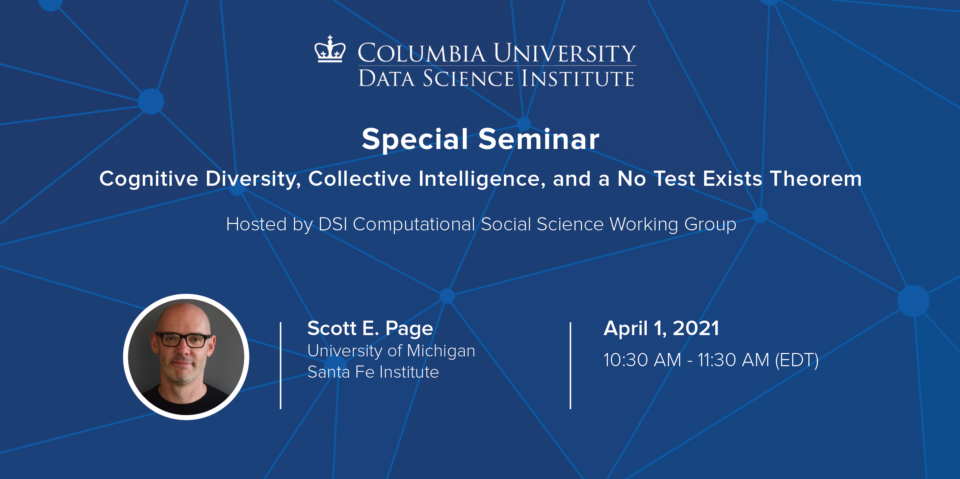Special Seminar: Scott E. Page, University of Michigan
Thursday, April 1, 2021
6:30 am - 7:30 am


A special seminar from DSI Computational Social Science Working Group.
Scott E. Page, John Seely Brown Distinguished University Professor; and Williamson Family Professor of Business Administration, Ross School of Business, University of Michigan-Ann Arbor. Page is also External Faculty at the Santa Fe Institute.
April 1, 2021 (10:30 AM – 11:30 AM ET) – Online Event
REGISTER HERE
DSI Computational Social Science Working Group
Cognitive Diversity, Collective Intelligence, and a No Test Exists Theorem
Abstract: Collective intelligence can refer either superadditive performance, when the group outperforms its best member) or emergent functionalities, where the group possesses capabilities not present in the individuals. Superadditive collective intelligence arises when diverse and talented assemblages create, predict, solve, or determine logical truth or falsity. Those assemblages can consist of people, algorithms, or be hybrids of the two. While the types of diversity that matter – knowledge, experience, data, models, perspectives, or heuristics – varies by the type of task, the relative benefits of diversity generally increase with task complexity. This seminar will work through multiple models that show how diversity drives collective intelligence and then describe a necessary and sufficient condition for the existence of a test applied to individuals that determines the best team.
Bio: Scott E. Page’s research focuses on the myriad roles that diversity plays in complex systems. For example, how does diversity arise? Does diversity make a system more productive? How does diversity impact robustness? Does it make a system prone to large events? He has written five books: “The Model Thinker – What you need to know to make data work for you” – stresses the application of ensembles of models to make sense of complex phenomena; “The Diversity [Bonus] – How Great Teams Pay Off in the Knowledge Economy” the follow up and expansion on the themes in The Difference; “The Difference”, which demonstrates the benefits and costs of diversity in social contexts, Complex Adaptive Social Systems (with John Miller), which provides an introduction to complexity theory, and, most recently, Diversity and Complexity, which explores the contributions of diversity within complex systems. Read full bio here.